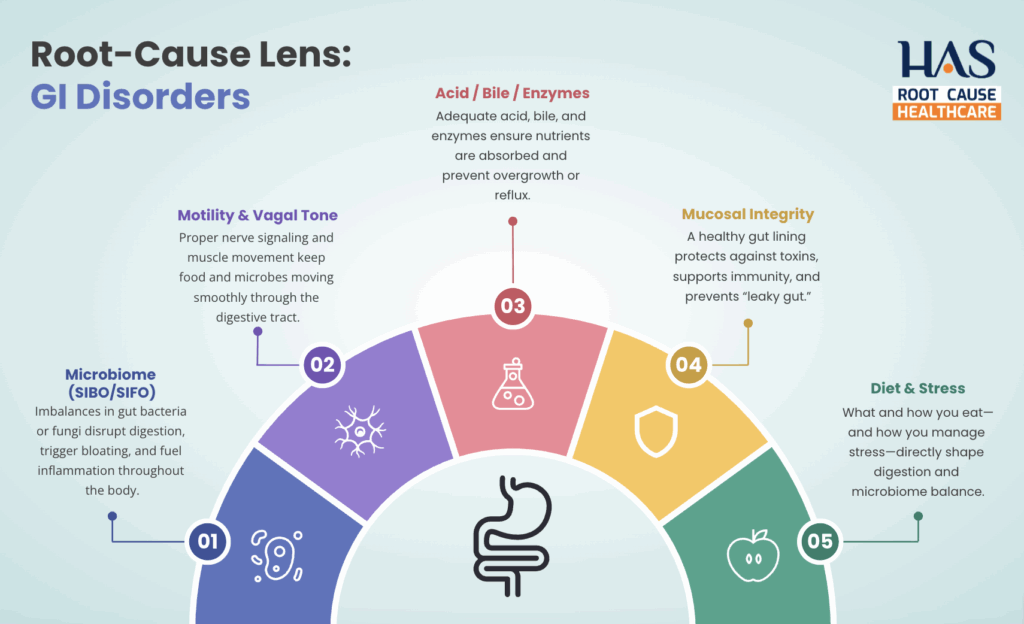Bloating, reflux, constipation/diarrhea, food reactions, or “normal” scopes but you still feel awful? At Healing Advanced Solutions, we go after why: microbiome imbalances (SIBO/SIFO), motility, stomach acid/bile/enzymes, digestion and absorption, and the gut–brain–immune axis. Then we build a staged plan—nutrition, motility support, targeted antimicrobials when indicated, and relapse prevention—to get you better and keep you better.
Persistent bloating, reflux, or gut discomfort even with “normal” tests? We identify the root cause—SIBO/SIFO, motility, digestion, or the gut–brain axis—and create a personalized plan to restore balance and lasting relief.
Conventional care is essential for red-flags, but many chronic GI symptoms persist despite normal imaging. We combine a detailed history, symptom mapping, and targeted labs—noninvasive hydrogen/methane breath testing when appropriate, contextual Indican urine for dysbiosis/maldigestion, stool and nutrient markers—and we interpret them in context to avoid over- or under-treating. Breath tests are widely used and noninvasive, but they’re imperfect; glucose and lactulose each have pros/cons, so choice and interpretation matter. We then personalize nutrition (often time-limited low-FODMAP or tailored elimination), motility/vagal support, digestive aids, and sleep/stress work for durable results.
We test only when results change your plan—and design for relapse prevention from day one.

IBS isn’t simply a “sensitive stomach.” It often reflects disrupted communication between the gut, brain, and microbiome. Stress, diet, and prior infections can alter motility, serotonin signaling, and immune activity in the intestinal wall. At Healing Advanced Solutions, we evaluate these connections through advanced microbiome and motility testing, then rebalance both the biology and the nervous system with nutrition, targeted antimicrobials, vagal-tone support, and stress-regulation strategies to calm the gut–brain loop and restore normal rhythm.
Reflux isn’t always about “too much acid.” Many patients actually have low stomach acid (hypochlorhydria), sluggish gastric emptying, or mechanical issues such as a hiatal shift that cause contents to move upward. Our assessment looks at acid production, bile flow, enzyme levels, microbiome patterns, and food triggers to uncover the true cause. We design stepwise programs that rebuild digestive competence—often reducing or eliminating the need for chronic PPIs—by restoring proper acid balance, improving motility, and strengthening the gastric barrier for lasting relief.
Persistent bloating signals impaired digestion or microbial imbalance rather than “just gas.” We differentiate between bacterial overgrowth (SIBO), fungal overgrowth (SIFO), carbohydrate malabsorption, and methane-dominant IMO that slows transit. Using breath, stool, and indican testing, we identify the underlying driver and tailor therapies such as motility enhancers, specific probiotics or antimicrobials, and enzyme or bile support. The goal is to correct function, reduce distention, and prevent relapse through long-term microbiome stability and optimized digestion.
Small Intestinal Bacterial Overgrowth (SIBO) occurs when bacteria that normally live in the large intestine migrate and multiply in the small intestine. This disrupts digestion, nutrient absorption, and the gut–brain axis.
Common symptoms include bloating, abdominal discomfort, gas, diarrhea or constipation, nutrient deficiencies, skin issues, and fatigue.
Functional medicine goes beyond labeling SIBO—it asks why it developed. Factors like slowed motility, low stomach acid, bile insufficiency, prior antibiotic use, or structural changes can all play a role. At Healing Advanced Solutions, breath testing (hydrogen/methane) helps identify bacterial activity, but results are interpreted in context—symptoms, transit time, and metabolic type all matter.
Our approach focuses first on rebalancing digestion and motility through nutrition, enzyme and bile support, and circadian rhythm repair before considering antimicrobial therapy. The goal isn’t only to clear overgrowth—it’s to restore normal small-bowel function and prevent recurrence.
Small Intestinal Fungal overgrowth (SIFO) mirrors SIBO in its symptoms—bloating, abdominal pain, irregular bowel habits, and often brain fog or sugar cravings. It results from an overgrowth of yeast or fungal organisms within the small intestine, sometimes following antibiotic exposure or chronic acid-suppressing therapy (PPIs).
Because the gold-standard diagnostic test (aspirate culture) is invasive, functional medicine clinicians rely on a combination of noninvasive markers, symptom patterns, and therapeutic response to identify likely cases.
Risk factors include low stomach acid, dysmotility, high-sugar diets, stress, or immune imbalance.
The focus of treatment is on restoring motility, rebuilding microbial diversity, and improving mucosal immunity, rather than aggressive antifungal use alone. Supporting digestion (acid, bile, and enzymes), modulating the immune system, and stabilizing the gut environment help prevent recurrence.
The Indican (Obermeyer) urine test is a simple, noninvasive marker that reflects how bacteria in the small intestine metabolize tryptophan, an amino acid from protein digestion. When gut bacteria ferment tryptophan excessively, they produce indole compounds that are excreted as indican in the urine—creating a functional indicator of protein maldigestion or dysbiosis.
A high indican value may suggest small-bowel bacterial or fungal overgrowth, poor protein breakdown, or slow transit—but it is not a diagnosis on its own. In functional medicine, we use it as a contextual clue—interpreted alongside symptoms, stool or breath testing, and overall clinical presentation.
Because the test is low-cost and easy to perform from a first-morning urine sample, it’s ideal for monitoring progress through gut restoration programs or protein-digestion support. At Healing Advanced Solutions, we use the Health Kaizen Indican testing system, which offers precise gradation for tracking functional improvement over time.
Healing chronic gut conditions isn’t about quick fixes—it’s about addressing each phase in the right order. Here’s how our stepwise approach helps you stabilize, treat, and stay well long-term.
We start by mapping your health story—reviewing symptoms, prior labs, and lifestyle factors. You’ll leave with clear goals, a testing plan, and next steps rooted in your unique biology.
We rebuild digestive rhythm and stability: optimizing diet, motility, and sleep while restoring acid, bile, and enzyme balance. These foundations make all later steps more effective.
When overgrowths or infections are confirmed, we use precise herbal or prescription antimicrobials while supporting the gut lining, reintroducing foods, and preventing relapse.
We restore microbial diversity and long-term gut resilience through fiber titration, nutrition refinement, and nervous system balance—aimed at lasting results.
Not always. We start with foundations and only test when results will change your plan. When used, we choose and interpret glucose vs lactulose hydrogen/methane in context.
Functional GI symptoms can persist with normal imaging. We evaluate motility, digestion (acid/enzymes/bile), and the microbiome to find why you still feel unwell.
SIFO involves fungal overgrowth with overlapping symptoms. We use clinical patterns, noninvasive tests, and response-guided care to tailor safe, staged plans.
Yes—as a contextual urine marker of bacterial tryptophan metabolism. It’s useful alongside symptoms/other labs, not a standalone diagnosis.
Many notice changes in 2–6 weeks as foundations take hold; timing varies by drivers (motility, overgrowth, diet, stress) and relapse history.
Yes — absolutely. The gut and brain communicate constantly through the vagus nerve and stress hormones. When you’re under stress, motility slows, stomach acid and enzymes shift, and inflammation increases. Our care plan includes strategies to support the gut–brain axis—from breathing exercises and HRV optimization to sleep and nervous system rese
Bloating, reflux, IBS—or “normal” tests but still miserable?
We’ll uncover why and fix it step by step—so you can feel like yourself again.

(904) 373-1661